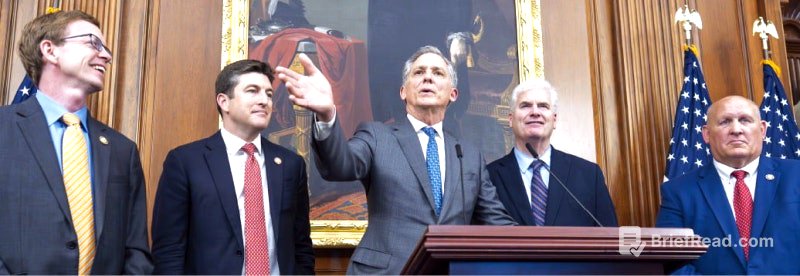TLDR;
The U.S. House of Representatives passed the "Virtual Asset 3 Laws," which include incorporating stablecoins into the institutional framework. This move aims to establish the U.S. as a cryptocurrency hub, backed by dollar and treasury bond collateral, and potentially allowing retirement fund investments in cryptocurrencies.
- The "Genius Act" mandates stablecoin issuers to hold reserves in U.S. dollars or short-term Treasury bonds.
- Other bills passed include the "Clarity Act" to classify cryptocurrencies as securities and the "Anti-CBDC Surveillance State Act" to prohibit the issuance of a U.S. central bank digital currency.
- A potential executive order may allow investments in cryptocurrencies, gold, and private equity through individual retirement accounts.
Stablecoins Enter the Institutional Framework: U.S. House Passes 'Virtual Asset 3 Laws'
The U.S. House of Representatives passed the 'Coin 3 Laws,' which incorporate stablecoins into the institutional framework, marking a significant step in recognizing cryptocurrencies as mainstream investment assets. The 'Genius Act,' which regulates stablecoins within a defined framework, was approved with 308 votes in favor and 122 against. This act requires stablecoin issuers to secure their issuances with stable assets like U.S. dollars or short-term Treasury bonds.
Key Bills Passed by the House
In addition to the 'Genius Act,' the House passed the 'Clarity Act' aimed at classifying cryptocurrencies as securities, and the 'Anti-CBDC Surveillance State Act,' which prohibits the U.S. Federal Reserve from issuing a digital currency. These bills garnered significant bipartisan support, though some critics warn they could sow the seeds for the next financial crisis. These bills will now move to the Senate for further consideration.
Potential Impact on Retirement Investments and Global Finance
President Trump is expected to sign an executive order that would allow Americans to invest in cryptocurrencies, gold, and private equity through their individual retirement accounts. This move could trigger a major shift in the global financial market as large institutional investors start including cryptocurrencies in their investment portfolios.
Stablecoins and Trump's Vision for U.S. Financial Dominance
The passage of stablecoin regulations in the U.S. is seen as a historic milestone for global finance and monetary order. It extends the dollar's dominance into the digital realm, potentially impacting the currency sovereignty of other nations. The 'Genius Act' is the first federal regulation in the U.S. that stipulates the requirements for issuing stablecoins pegged to fiat currencies like the dollar, including reserve management and disclosure obligations.
The Role of Stablecoins in Strengthening the Dollar and U.S. Treasury Market
The institutionalization of dollar stablecoins is expected to solidify the dollar's dominance as a digital currency, with about 99% of stablecoins worldwide being dollar-linked. Stablecoins could also help alleviate the U.S.'s debt issues by creating a new demand source for U.S. Treasury bonds. Stablecoin issuers are required to hold reserves in cash or short-term U.S. Treasury bonds, potentially increasing demand for these bonds by up to $2 trillion.
Potential Risks and Challenges
Despite the opportunities, there are concerns about potential systemic risks. A loss of confidence in stablecoin issuers could trigger a 'coin run,' leading to a massive sell-off of Treasury bonds and causing liquidity shocks in the global financial market. The expansion of dollar stablecoin transactions could also impact foreign exchange management and monetary policy in countries like South Korea, potentially leading to dollarization and weakening the government's policy response during crises.









